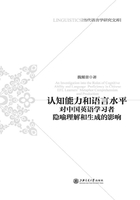
1.5 Terminological issues
1.5.1 Conceptualization of cognitive ability
As is stated in the above section, the present research is mainly concerned about the roles of cognitive ability and language proficiency in the Chinese EFL learners'metaphor comprehension and production, and it is, therefore, quite necessary to define the two terms first.Cognitive ability is a frequently used term in cognitive sciences.Although different definitions are given in different sciences to meet different aims, it is generally considered to be any cognitive activity that is associated with enhanced cognitive processing.Specifically, it is regarded as a conscious intellectual activity such as thinking, reasoning, remembering, imaging, or learning words.For the present research, Gyori's theory seems to be more revealing.Gyori(2002:128)relates cognition and language, believing that cognitive processes operate in the minds of individual speakers accompanying their current linguistic behavior.Based on this theory, the present research refers to cognitive ability as the ability that learners possess to know the world, i.e., the ability to find the differences and similarities between the things they intend to know, and the ability to make use of their linguistic knowledge to express them, and the ability to know the world with the help of their linguistic knowledge.More importantly, it also refers to learners'awareness of dealing with the above-mentioned things.In other words, cognitive ability defined here also includes learners'metacognitive ability.Metacognition5is included mainly for the reason that relevant studies show that it usually overlaps with cognition because the same strategy can be cognitive and metacognitive as well(Livingston 1997; Collins et al 2006:1)and that it closely interacts with cognition, although some researchers distinguish one from another6(Sjostrom 1998:72;Graham 1997:42-43).Flavell uses an example to show how metacognition interacts with cognition, which is illustrated in the following.
For instance, we suddenly get the vague sensation (metacognitive experience)that we may not fully understand what we have j ust read, so we review (cognitive action)the material and our interpretation of it in order to find out exactly what, if anything, is amiss (another metacognitive experience).Or we may decide to read something for some purpose(establish a goal)and start by skimming parts of it(cognitive action)in order to get some initial sense of how hard the going is likely to be (metacognitive experience).
(Forrest-Pressley & Waller 1984:1)
Therefore, the two strategies are closely intertwined and dependent upon each other, any attempt to examine one without the other would not provide an adequate picture(Livingston 2006:3).Since cognition and metacognition run concurrently in the process of a cognitive activity, it can be inferred that learners who are cognitively competent should be those who are metacognitively competent.With this inference in mind, the present research conceptualizes cognitive ability as an ability to be both cognitive and metacognitive.